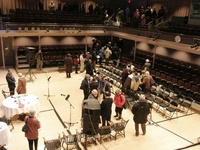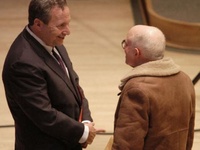
University President Lawrence H. Summers, left, and Provost Steven E. Hyman walk through Harvard Yard yesterday afternoon on the way to the Faculty meeting at Lowell Lecture Hall.
At yesterday’s Faculty meeting, professors dismissed an idea favored by top administrators for a three-person committee to mediate between University President Lawrence H. Summers and the Faculty of Arts and Sciences, criticizing it as undemocratic and prearranged.
During the first hour of the meeting—which was a continuation of last Tuesday’s contentious Faculty meeting—many faculty members continued to criticize Summers’ leadership of the University, though their remarks had a more conciliatory tone than those made last week. Much of the conversation focused on ways Summers could restore power to the Faculty and strengthen professors’ trust in him, and a much-discussed no confidence vote in Summers’ leadership was not held.
Whereas only one professor openly spoke in support of Summers last week, his allies—particularly from the economics department—were vocal yesterday in arguing that he has already begun to change his leadership style in response to Faculty pressure.
“Some was more pleasant to hear. There was a lot that was less pleasant to hear,” Summers said at the end of yesterday’s meeting. Summers had described last week’s meeting as “searing.”
Approximately 500 professors packed yesterday’s meeting, which was moved from the Faculty Room, where the monthly meetings are normally held, to Lowell Lecture Hall which can accommodate over twice as many people. Faculty meetings normally draw about 125 professors, but yesterday faculty who had never before attended a meeting found themselves standing for two hours to participate in the much-anticipated session. The outside of Lowell Lecture Hall was mobbed by local and national media seeking to cover the meeting (please see story, above).
More professors had requested to speak at yesterday’s meeting than time would allow, even though the Faculty did extend the meeting from 90 minutes to two hours. Eighteen professors spoke yesterday, in addition to Dean of the Faculty William C. Kirby and Summers.
Kirby announced he will convene a series of informal discussions on these issues with the Faculty and Summers before the next regularly-scheduled Faculty meeting on March 15.
No motion was made to hold a vote of no confidence at today’s meeting.
In response to questions from The Crimson, Professor of Anthropology and of African and African American Studies J. Lorand Matory said he plans to put a motion for a no confidence vote on the docket for the next meeting.
“In fact, I’ll do it right now,” he said after the meeting, adding that he thinks Summers should resign.
The tension and anger that pervaded last week’s meeting was largely absent from yesterday’s continuation of last Tuesday’s session.
The three-person committee proposed at the meeting—which would have been composed of former Dean of the Faculty Jeremy R. Knowles, Thomas Professor of Government and Sociology Theda Skocpol, and Pforzheimer University Professor Sidney Verba ’53—would have worked to “reshape the interactions of the President and the Faculty and to help communicate the Faculty’s concerns to the governing board,” Knowles said.
While many professors said they appreciated the gesture represented by the plan, most applauded when Reid Professor of English and American Literature Philip J. Fisher called the idea undemocratic, effectively killing the proposal.
“I find myself in a meeting that has the slight feeling of an arranged outcome to it,” Fisher said. “It does not seem to me to draw on the many unheard voices in this room.”
Knowles appeared visibly shocked by the rebuke, and Summers seemed visibly disappointed by the plan’s failure.
Recommended Articles
-
Summers To Face Faculty StormUniversity President Lawrence H. Summers will face the full Faculty of Arts and Sciences (FAS) today for the first time
-
 Summers Faces Crisis of Confidence
Summers Faces Crisis of Confidence -
 Tense Past Jeopardizes Summers’ Future
Tense Past Jeopardizes Summers’ Future -
Professors Welcome Release, but Critics Say That Concerns Over Leadership RemainIn releasing the transcript of his Jan. 14 remarks on women in science yesterday, University President Lawrence H. Summers acceded
-
 Faculty Dismiss Proposed Mediation Committee
Faculty Dismiss Proposed Mediation Committee -
The Question of LeadershipCan Summers still govern? Maybe. On Tuesday, the Faculty of Arts and Sciences (FAS) declared that it “lacks confidence” in















